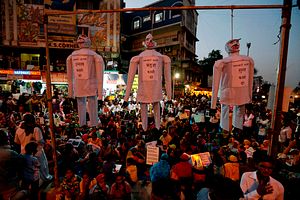In India’s ongoing project to combat child sexual assaults, the weekend was filled with cheer, or gloom, depending whom you speak to. The death penalty was approved as a punishment for the rapists of girls below the age of 12, following an ordinance that amended an existing criminal law. Many in the country cheered while many others questioned how the death penalty would function as a deterrent.
The rushed decision, part of finding a way to quiet the anger that erupted following the gruesome rape of two minors in India in the past weeks, is a knee-jerk reaction after an emergency meeting called by Indian Prime Minister Narendra Modi. This bears significance, given that in both cases, men associated with Hindu right-wing groups – which in turn are closely associated with the ruling Bharatiya Janata Party (BJP) – have been found to be hand-in-glove with the rapists.
In the case of Unnao, one BJP politician allegedly raped the 17-year-old victim last year, and her pleas for justice resulted in her father dying in police custody. On the other hand, the abduction and rape of an 8-year-old girl over a week in Jammu in January, and her subsequent murder, led to, among other reactions, the resignation of two state ministers from the BJP.
But has stringent punishment deterred men and boys from raping women? That seems unlikely. The scope of rape laws was expanded following a woman’s ghastly gang rape on a bus in December 2012. The rape law that was amended in 2013 prescribes the death penalty and life imprisonment for sexual assaults that result in death or the victim being reduced to a persistent vegetative state.
Furthermore, India’s Protection of Children from Sexual Offenses Act (POCSO) of 2012, which covers victims below 18 years of age, prescribes that the court should complete a trial within a year. But the reality is far from what is expected.
Reported rape cases climbed 60 percent to around 40,000 across the country in 2016; of this, 19,765 were cases of child rape. The conviction rate is stagnant at around 25 percent. And given the persistent taboo surrounding sex and sexual assault, it’s likely that the actual incidence of rape is even higher.
Then, there is the backlog of rape cases pending trial, which stands at more than 133,000 by the end of 2016, up from about 100,000 in 2012, as per data from the country’s National Crime Records Bureau (NCRB).
A nation-wide study of 2007, covering 13 states with a sample size of 12,447 children, 2,324 young adults and 2,449 stakeholders, found that 50 percent of all abusers are persons known to the child or in a position of trust and responsibility. It is hence not surprising that a majority of child sexual assault victims turn hostile somewhere during that long-winding judicial path to secure justice.
The recent ordinance that confers the death penalty to those who rape girls below the age of 12 is also designed within a patriarchal framework, by its exclusion of punishment for boys who are raped. An environment of patriarchy and misogyny gags any conversation about sex and gender education in India, which perpetrates an understanding of sex as an act of dominance by men over women, thus completing the vicious cycle that perpetrates toxic masculinity.
The death penalty also falls far short of addressing the needs of the child – male or female – after the horror that she or he might have suffered. Data from 2015 revealed that in 94.8 percent of all cases, the perpetrator was someone known to the child.
In such a scenario, this puts the child’s caregivers in a dilemma, especially when the perpetrator is a family member: should the child’s hurt be honored by the pursuit of justice, or should the relative be protected? The death penalty looks beyond the context of the reality of many Indian households, and once again misses the point of protecting the child.
Any measure of stringent punishment, especially in the case of sexual assaults in a country where sex is still a taboo subject and sex education continues to be off the school curriculum, will never be a deterrent. It only confirms that only the worst can be expected of the boys and men: echoing rhetoric by politicians that boys will be boys, thereby curtailing women’s freedoms.
At the protests across the country in the last two weeks, most posters alluded toward seeking justice for “India’s daughters.” But if we want to protect India’s daughters, who is teaching India’s sons to keep their hands off the girls and women?
The impact of the death penalty ultimately will turn out to be ineffective in preventing the rape of children. But it confirms one fact: India’s sons will continue to misbehave.

































